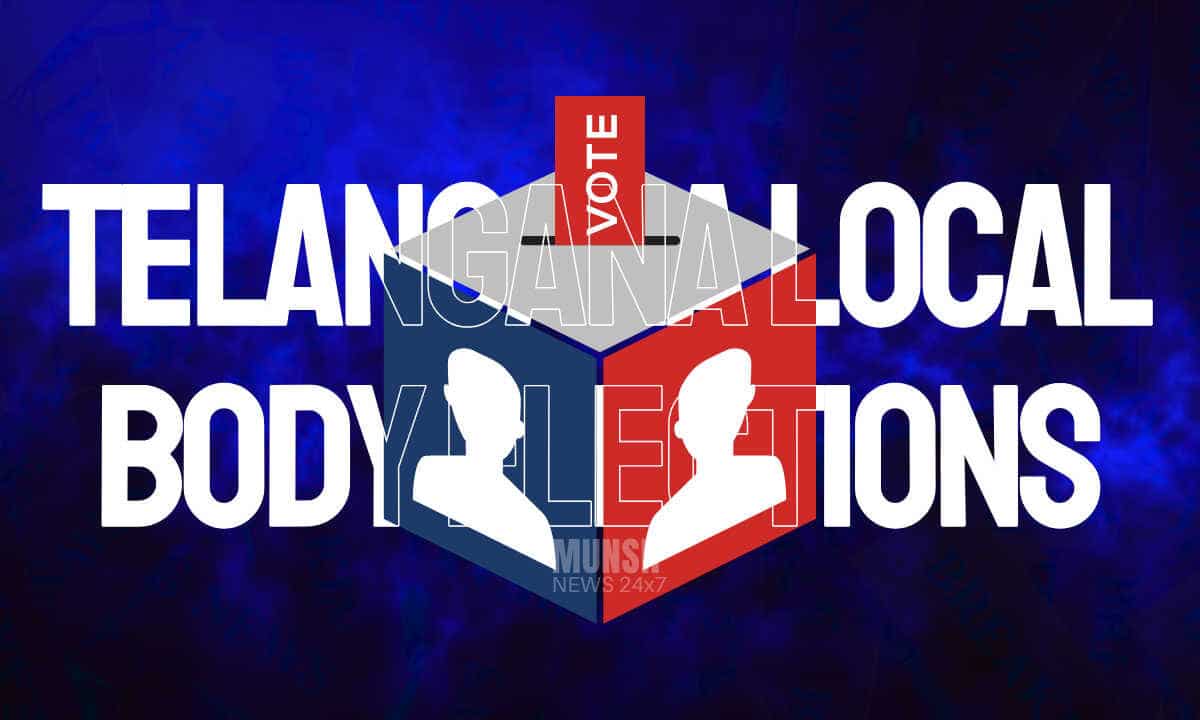Telangana Local Body Elections 2025: Code of Conduct Affects Cash, Campaigns, and Government Operations
The Model Code of Conduct is in effect for Telangana's 2025 rural local body elections, impacting cash limits, government operations, and campaign rules across 31 districts.

HYDERABAD – The Model Code of Conduct (MCC) for the Telangana rural local body elections 2025 has been in effect since September 29, 2025. This follows the announcement of a five-phase election schedule, which will run from October 23 to November 8, 2025. The elections will cover 565 mandals across 31 districts, determining representatives for MPTCs, ZPTCs, and Gram Panchayats.
Also Read: Telangana Private Colleges to remain Closed from October 13: Find Out Why and For How Long
Table of Contents
Financial Restrictions and Cash Monitoring
The MCC imposes strict financial regulations to ensure fair elections. A key measure restricts individuals from carrying more than Rs 50,000 in cash without valid documentation. This applies to all citizens during the MCC period. Cash found exceeding this limit without proper justification faces immediate seizure by authorities.
Expenditure caps have also been set for candidates:
- ZPTC candidates: Maximum Rs 4 lakh
- MPTC candidates: Maximum Rs 1.5 lakh
- Sarpanch candidates (Gram Panchayats with 5,000+ population): Rs 2.5 lakh
- Sarpanch candidates (Gram Panchayats below 5,000 population): Rs 1.5 lakh
- Ward members (5,000+ population): Rs 50,000
- Ward members (below 5,000 population): Rs 30,000
Failure to submit expenditure accounts within 45 days of the election results in disqualification from contesting panchayat elections for three years.
Government Operations Severely Restricted
Government functions directly or indirectly related to election administration face significant limitations.
Transfer and Posting Ban
A complete ban on transfers and postings of all government officials involved in election administration has been enforced. This freeze remains active until the electoral process concludes, impacting numerous government employees.
Government Advertisement Restrictions
All government advertisements and publicity campaigns have been suspended. This includes official announcements of new schemes, government-sponsored media campaigns, and any use of official resources for publicity purposes.
Official Vehicle Restrictions
The use of official vehicles by political parties, candidates, or anyone connected with the elections is prohibited. Government transport, including aircraft and machinery, cannot be used for promoting party interests.
Campaign and Public Activity Regulations
Campaign activities are subject to specific guidelines to maintain order and fairness.
Loudspeaker Time Restrictions
The use of loudspeakers and public address systems is restricted to between 6 AM and 10 PM. Night-time use from 10 PM to 6 AM is strictly prohibited, with violations leading to equipment confiscation. Vehicle-mounted loudspeakers require prior police permission.
Meeting and Rally Guidelines
Political parties must obtain prior permission from local authorities for all meetings and rallies. They must also coordinate to prevent clashes with other parties’ events and follow police instructions for processions to minimize traffic disruption.
Social Media and Digital Monitoring
Authorities have implemented enhanced surveillance of social media content. Monitoring focuses on MCC violations in digital campaigns, deepfake content, manipulated media, unauthorized party advertisements, and bulk messaging with malicious intent.
Ballot Paper System Implementation
These local body elections will utilize traditional ballot papers and ballot boxes instead of Electronic Voting Machines (EVMs). The State Election Commission has procured ballot boxes from other states to meet the demand. This decision impacts polling procedures, security arrangements for ballot storage, and counting processes.
Security and Surveillance Measures
Comprehensive security and surveillance measures are in place to monitor the election process.
Enhanced Force Deployment
Flying Squad Teams (FST) and Static Surveillance Teams (SST) are deployed to monitor MCC violations. Video surveillance teams record campaign activities, and GPS-enabled vehicles provide real-time monitoring of enforcement teams.
Expenditure Monitoring
Specialized teams monitor election expenses of candidates and political parties, star campaigner expenditures, cash movements, and advertisement expenses across various media platforms.
Educational Institution Impacts
Educational institutions will experience closures during the election period. Schools and colleges will be closed on polling days for use as polling centers. Teacher deployment for election duties will also affect regular academic schedules, with typical two-day closures for election-related activities.
Candidate Eligibility Restrictions
The two-child policy remains in effect for rural local body elections. Candidates with more than two children are disqualified from contesting.
What is Allowed Under Current Restrictions?
Despite the extensive restrictions, legitimate political activities are permitted. These include general party campaigning within prescribed hours, door-to-door canvassing with appropriate permissions, distribution of authorized campaign materials, and public meetings with proper permits. Essential services such as ambulances, fire services, police, and transportation of essential commodities are also allowed. Private vehicle use for personal purposes unrelated to elections and regular banking services can continue.
Enforcement Mechanisms and Penalties
Violations of the MCC carry various penalties, including cash seizures, equipment confiscation, three-year disqualification for expenditure violations, and legal action under relevant laws. Real-time surveillance through mobile applications, GPS tracking of enforcement vehicles, and video recording of major campaign events are part of the monitoring system.
Recent Developments and Unique Aspects
The 2025 Telangana local body elections are notable for their use of ballot papers, a significant 42% reservation for Backward Classes, digital monitoring for expenditure and social media, and comprehensive coverage across 31 districts involving over 1.67 crore voters. The robust enforcement of the MCC highlights the Election Commission’s commitment to ensuring free and fair elections and maintaining the integrity of the democratic process.
